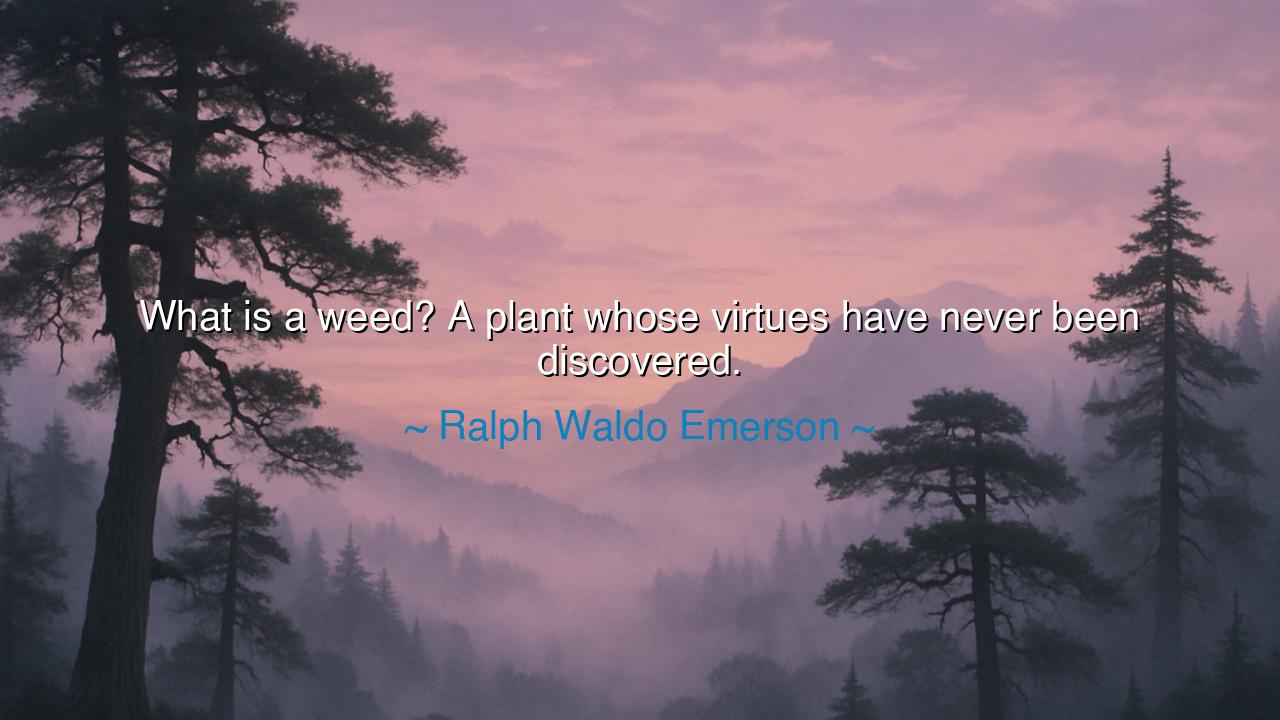
What is a weed? A plant whose virtues have never been discovered.






In the silent whispers of the earth, there exists a question that has echoed through the ages, a question that speaks to the very heart of how we perceive the world around us. What is a weed? This question, posed by the sage Ralph Waldo Emerson, carries with it a profound truth that transcends time and culture. He answers with a simple, yet powerful statement: "A plant whose virtues have never been discovered." In these words lies a deep and timeless wisdom, a wisdom that calls us to look beyond the surface, beyond our judgments, and to recognize the hidden potential in all things.
In the eyes of many, a weed is nothing more than a nuisance, an unwanted plant that disrupts the harmony of cultivated gardens or fields. It is an intruder, a symbol of chaos in a world that seeks order. But Emerson challenges us to reconsider this narrow view. What if the weed is not merely an invader, but a teacher, a plant with virtues yet to be discovered? The virtue of a weed lies not in its outward appearance or its place in the grand order of the garden, but in the value it offers to those who look deeper. Perhaps the very fact that it thrives where others falter is a lesson in resilience. Perhaps its strength is not a curse but a gift, a gift that can teach us the power of perseverance in adversity.
Let us turn to the example of the dandelion, that humble and often overlooked plant that is frequently deemed a weed in the eyes of many. Yet, the dandelion has long been celebrated for its healing properties. In ancient herbalism, the dandelion was known as a powerful remedy for the liver, a cleanser of the body’s impurities, and a symbol of renewal. In a world where so many plants are cultivated for their usefulness, the dandelion offers its virtues freely, without the need for human intervention. And yet, how many fail to recognize its worth, dismissing it as little more than an inconvenience? The lesson here is clear: what the world often casts aside may carry within it the very qualities we need—health, resilience, and healing.
This wisdom is echoed throughout history. The great Hippocrates, father of medicine, often turned to the simplest of plants, those that grew wild and untended, for remedies. He recognized what others did not—the hidden power in what was dismissed as commonplace or unremarkable. He understood that there are no true "weeds" in nature, only plants whose value has yet to be understood. The world of medicine was transformed not by the most exotic or cultivated of herbs, but by the humble, wild plants that carried their wisdom quietly in the soil. It was through patience and observation that their virtues were uncovered.
Emerson's words go deeper still, for they speak not only to plants, but to life itself. How often do we, like gardeners, view aspects of our lives or the people around us as "weeds," dismissing them as distractions, as nuisances, as failures? How often do we label those who do not fit our expectations, who do not grow in the neat rows we have set before them, as undesirable? Yet, what if these so-called "weeds" are merely unrealized potential, waiting to be discovered? What if the very people or experiences we dismiss as obstacles are, in fact, the sources of growth and wisdom that we need?
The lesson of Emerson’s quote is one of perspective and growth. Just as a weed may carry within it hidden virtues, so too do the challenges, the struggles, and the people we encounter in life. We must not rush to judge, to label, or to discard. Instead, we must learn to see with new eyes, to look deeper, and to recognize the value in the things we have overlooked. Patience, understanding, and curiosity are the keys that unlock the hidden gifts of life, just as they unlock the virtues of the weed.
Let us take these teachings into our daily lives. The next time we encounter a "weed" in our garden or in our hearts, let us pause and ask ourselves: What is the virtue here that I have not yet seen? Let us approach our challenges with the understanding that they may hold the very lessons we need. Let us recognize that those things we often dismiss or overlook may, in fact, be the very seeds of wisdom, growth, and resilience that will help us thrive. Like the weed, we too have hidden strengths, virtues, and gifts, waiting to be discovered—not by others, but by ourselves.
In the end, the true beauty of the world lies in its imperfections, in the unseen, and in the unexpected. Let us embrace the weeds of our lives and seek to understand the hidden gifts they offer. In doing so, we will come to realize that there are no weeds, only undiscovered virtues, and that the world, in all its untamed splendor, is a garden of endless possibilities.






AAdministratorAdministrator
Welcome, honored guests. Please leave a comment, we will respond soon